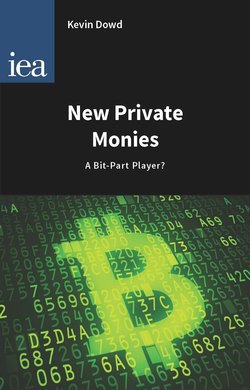Читать книгу New Private Monies - Kevin Dowd - Страница 4
На сайте Литреса книга снята с продажи.
Foreword
ОглавлениеIn the 2014 Budget, the Chancellor of the Exchequer, George Osborne, announced that a new pound coin would be issued. The Chancellor made much of the fact that it would have twelve sides and look like the old ‘three-penny bit’. It was interesting that the Chancellor chose to make such a comparison. When the new coin is brought in it will buy just 20 per cent more than the three-penny bit bought when it was introduced to replace the silver three pence coin in 1937. This illustrates the poor record of state money when it comes to keeping its purchasing power and maintaining a store of value.
State monies have increasingly become open to competition with each other as a result of the breakdown of exchange controls. Arguably, this has been one of the factors that has led to better inflation performance. However, there has been very little competition between state money and private sector monies. Now, that situation is changing – though only at the margin.
Kevin Dowd, one of the foremost experts on private money and free banking, takes us through the recent history of private monetary systems. Some of these have been based on gold, such as the Liberty Dollar and e-gold; others, such as Bitcoin, have been based on an entirely new system of limiting supply.
Many questions remain about the potential of these new innovations. For example, will they be able to fulfil the functions of money by becoming generally acceptable and maintaining a store of value? Will they reach a point where acceptability is sufficiently widespread that the network economies that we expect of money can be realised? Kevin Dowd does not pretend he knows the answers to these questions with certainty. However, he is sceptical that the new private monies of which we are currently aware will be the innovation that ends the state money monopoly. Nevertheless, new developments in this field have the potential to develop in such a way that they are able to transcend state money in ways that we cannot currently foresee. We need a process of competition to ensure that, should such new developments be beneficial, they will thrive.
It is doubtful that the environment exists currently that is conducive to such a process of competition. Law enforcement agencies have clamped down on new private monies and the regulatory environment in the US seems especially problematic. It is worth noting that many of the users of private monies see themselves as purposefully trying to undermine the regulatory power of an ever-more intrusive state. It is not surprising that the state objects to this.
Private monies have been used for certain illicit purposes and this is an issue on which readers will have different views – they may also differ on whether certain types of transaction should or should not be illegal. However, there are many ways in which people can evade the law and it is incumbent on law enforcement authorities to tackle evasion of the law explicitly rather than through trying to stamp out innovation within monetary systems and competition between them. Private monies are also used by people who simply wish to ‘thumb their nose’ at the state without doing anything illegal. They should feel at liberty to do this.
As with any other economic development, we cannot predict the future of new private monies with any accuracy. Nevertheless, Kevin Dowd performs a great service by helping readers obtain a better understanding of the likely prospects of success. If the state had still controlled telephony and banned all competition with fixed-line telephony, would we have had the iPhone and its competitors today? It is very doubtful to say the least. As such, it is important that the state leaves open the door to currency competition so that innovation is not choked off. Such innovations may take years or decades and many will fail, but we need to allow people to harness valuable innovation as it happens. As the author reminds us, this suggests that the government would do well to leave private monies alone.
The IEA commends this monograph to all who are interested in the future of money and, indeed, to all who are interested in the process of innovation in a free economy more generally.
Philip Booth
Editorial and Programme Director
Institute of Economic Affairs
Professor of Insurance and Risk Management
Cass Business School, City University
April 2014
The views expressed in this monograph are, as in all IEA publications, those of the author and not those of the Institute (which has no corporate view), its managing trustees, Academic Advisory Council members or senior staff. With some exceptions, such as with the publication of lectures, all IEA monographs are blind peer reviewed by at least two academics or researchers who are experts in the field.
